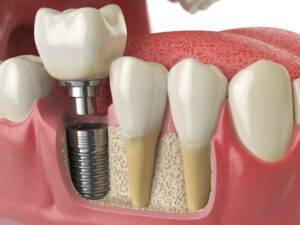 Tooth extraction should typically be a last resort. Pulling a tooth is generally reserved for cases where a tooth is so decayed or damaged that it is beyond saving with other treatment options, making extraction the best way to prevent further oral health deterioration. What’s important to remember is that, whether teeth have been extracted or have fallen out on their own, there is a major risk of jawbone recession in the area if additional treatment is not performed. The teeth and the jawbone have a crucial relationship: while the bone helps a healthy tooth by holding its roots securely in place, the roots help the bone by stimulating bone cells and enhancing its density. If the tooth and its roots are no longer there, the jawbone is in danger of degrading, which may cause existing teeth that surround the missing teeth to shift their position or even fall out altogether. The risk of gum recession and other major oral health problems is also significantly increased when the jawbone deteriorates. The good news is that these problems can often be prevented with treatments that can replace missing teeth and reduce the likelihood of bone loss affecting other aspects of oral health.
Tooth extraction should typically be a last resort. Pulling a tooth is generally reserved for cases where a tooth is so decayed or damaged that it is beyond saving with other treatment options, making extraction the best way to prevent further oral health deterioration. What’s important to remember is that, whether teeth have been extracted or have fallen out on their own, there is a major risk of jawbone recession in the area if additional treatment is not performed. The teeth and the jawbone have a crucial relationship: while the bone helps a healthy tooth by holding its roots securely in place, the roots help the bone by stimulating bone cells and enhancing its density. If the tooth and its roots are no longer there, the jawbone is in danger of degrading, which may cause existing teeth that surround the missing teeth to shift their position or even fall out altogether. The risk of gum recession and other major oral health problems is also significantly increased when the jawbone deteriorates. The good news is that these problems can often be prevented with treatments that can replace missing teeth and reduce the likelihood of bone loss affecting other aspects of oral health.
A restorative treatment such as dental implants can quite literally address “the root” of this concern. A dental implant combines an artificial tooth root made of durable titanium with a custom dental crown to create a full tooth replacement designed to look, function, and feel like a natural tooth. The bottom of the implant is placed through the gum and directly into the jawbone, where a process called “osseointegration” should fuse the implant with the bone growing around the threads of the implant. By making the implant a part of the bone, it can continue stimulating cell growth and minimize the risk of jawbone loss in the surrounding area. This unique benefit is in addition to a dental implant’s many aesthetic and functional advantages over other types of teeth replacement, ultimately making dental implants a truly comprehensive treatment option for missing tooth restoration. Implants can also help patients who have removable dental prosthetics by stabilizing the removable prosthetic.
Maintaining an excellent at-home oral hygiene routine and refraining from the use of tobacco products are also important steps to take after a tooth extraction. Gum disease can heighten the risk of jawbone recession, so keeping your oral health in the best shape possible after losing a tooth is vital.
Jawbone deterioration often begins very quickly after tooth loss, so it is a good idea to consider tooth replacement options right away. In cases of a planned extraction, it is recommended that patients start thinking about their replacement options even before that procedure is performed just to ensure that the missing tooth is treated as soon as possible.
Our dentists in Salisbury offer restorative dentistry services that can effectively address damaged and missing teeth to limit the risks they may pose to oral health, dental function, and smile aesthetics. For more information, or if you would like to schedule an appointment, please contact Delmarva Dental Services today.
